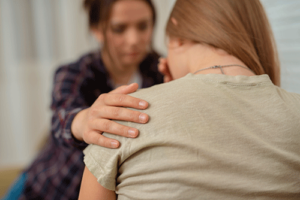 Stressful events can lead to long-term trauma, known as post-traumatic stress disorder or PTSD. While anyone can develop PTSD after a traumatic event, LGBTQ individuals may be at a much higher risk. This population may be more likely to experience trauma due to higher incidences of discrimination, violence, and social stigma imposed by society. Additionally, PTSD and other mental health conditions often co-occur with substance use disorder—another thing that the LGBTQ community is at higher risk of experiencing for many of the same reasons.
Stressful events can lead to long-term trauma, known as post-traumatic stress disorder or PTSD. While anyone can develop PTSD after a traumatic event, LGBTQ individuals may be at a much higher risk. This population may be more likely to experience trauma due to higher incidences of discrimination, violence, and social stigma imposed by society. Additionally, PTSD and other mental health conditions often co-occur with substance use disorder—another thing that the LGBTQ community is at higher risk of experiencing for many of the same reasons.
If you are an LGBTQ individual struggling with PTSD and an accompanying substance use disorder, you may not know where to turn. At La Fuente Hollywood’s LGBTQ mental health treatment in Hollywood, California, you will find a safe space where you can feel truly comfortable in your own skin as you start the healing process. For a customized PTSD treatment plan in a welcoming environment, contact our caring team at 888.903.9898.
What Is PTSD?
PTSD, or post-traumatic stress disorder, is a mental health condition that can develop after experiencing or witnessing a traumatic event. Some examples of events that can lead to PTSD are:
- Being physically or verbally assaulted
- Being sexually assaulted or molested
- Being the victim of domestic violence
- Being bullied
- Being involved in a car accident
- Losing someone close to you
You can develop PTSD from personally experiencing any of the above or witnessing such events happening to someone else. In some cases, you can even have PTSD from viewing media coverage of these types of events on TV or social media.
PTSD in the LGBTQ Population
LGBTQ individuals are more likely to experience traumatic events such as hate crimes, sexual assault, domestic violence, and bullying, increasing the chances of developing PTSD. Without PTSD treatment programs that address their unique needs, members of the LGBTQ community may either participate in a program with lackluster results or forgo getting professional help altogether. This can exacerbate PTSD as the person feels isolated in their struggle.
Unfortunately, members of the LGBTQ community may face additional barriers to getting treatment for PTSD. These can include a fear of discrimination or lack of understanding from healthcare professionals, financial barriers, and a lack of LGBTQ-affirming mental health resources. This can make it difficult for these individuals to receive the care they need to manage their symptoms and improve their quality of life.
Do You Need an LGBTQ PSTD Treatment Program?
Many people have post-traumatic stress disorder without realizing it. Traumatic events are not always memorable or intense. PTSD can develop from a series of events, such as chronically feeling left out or discriminated against, even if it is subtle. So how do you know if you would benefit from LGBTQ PTSD treatment? Here are a few signs that you may have unresolved trauma:
- Flashbacks of a disturbing event
- Nightmares of a traumatic event
- Anxiety
- Depression
- Avoidance behaviors
LGBTQ individuals may also experience additional PTSD symptoms related to their identity, such as shame, guilt, and internalized homophobia or transphobia. These symptoms can be debilitating and interfere with daily life. If you have experienced a stressful event, whether major or minor, and you notice the above symptoms, you may need the expertise of a PTSD treatment program. And for the most effective treatment option, look for a program designed with the LGBTQ community in mind.
La Fuente Hollywood: LGBTQ PTSD Treatment in California
At La Fuente Hollywood, we understand how much of an impact PTSD can have on LGBTQ individuals. We understand the unique challenges this population faces, and we work to create a more inclusive and supportive behavioral health treatment environment. By enrolling in our PTSD treatment program in Hollywood, you will receive the help and support you need to process trauma, manage your symptoms, and improve your overall well-being. To learn more about how we can help you reclaim your quality of life from PTSD, contact us at 888.903.9898 or complete our online form.
